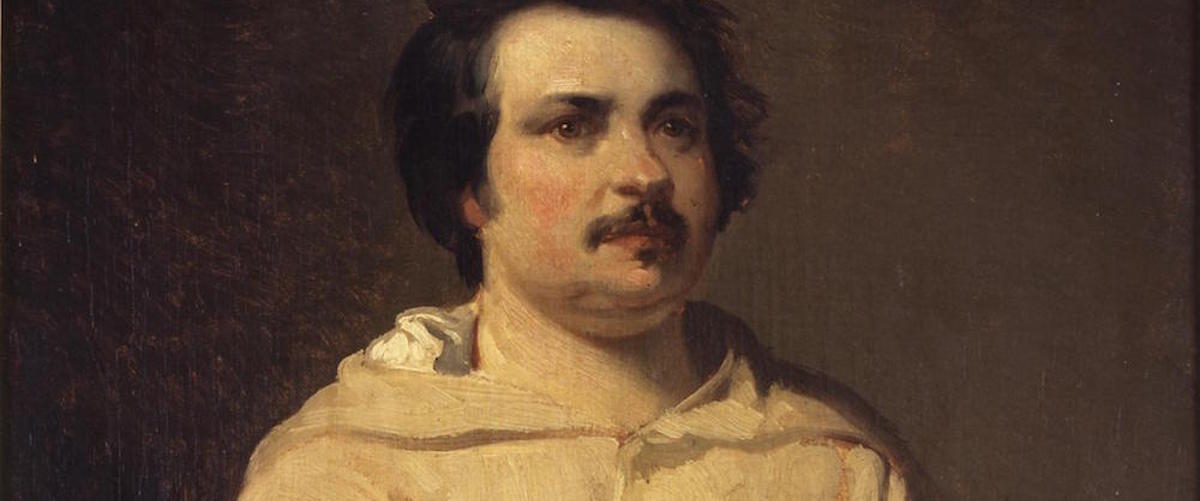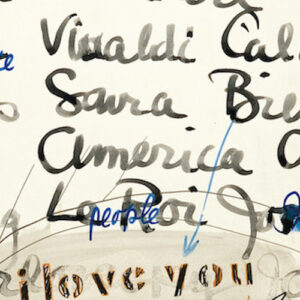There is no novelist between the picaresque and the postmodern better able to continually pull rabbits out of hats and hats out of rabbits in an endless unfolding—frog-marching the novel itself (as much as the reader or the characters) from to room to room—as Balzac. In his hands, the novel is the traveler. The novel has the appetite. The novel is unafraid of trivial matters like mixed metaphors, because it doesn’t trouble itself with the sort of overweening coherence—sometimes called gentility and in turn called realism when that word is used to mean Flaubert—that was yet to come.
Balzac is a writer about whom other writers have always felt able to be pithy, disparaging him in order to praise. Erich Auerbach notes that Balzac’s eye doesn’t really belong in the better drawing rooms, for he sees a price tag on everything, while Marx loved him precisely because there was a price tag on everything and, in his journal, Jules Renard asks if “Balzac alone was allowed to write badly?”
Proust, praising Balzac, says, “The vulgarity of his mind was so massive that a lifetime could not leaven it.” And Oscar Wilde is often enlisted to tell us we must read him because, “the nineteenth century as we know it, is largely an invention of Balzac” which sounds like he is merely being clever, but he also said, after quoting Baudelaire’s own massive praise,
A steady course of Balzac reduces our living friends to shadows, and our acquaintances to the shadows of shades. His characters have a kind of fervent fiery-coloured existence. They dominate us, and defy skepticism.
He does not stop there, but we must stop.
More soberly, Anthony Powell, neatly skewering Balzac’s most superficial rival, “Dickens never has the foggiest idea of how people earn a living; Balzac knows this very well. Indeed, he will drive a reader mad with detailed descriptions of the method in which some obscure trade or profession is conducted.”
For one of the greatest charges you can make against Dickens is that the money in his world is cheap magic (instantly penniless, effortlessly flush) the sort of magic that makes novels into fairy tales. Balzac, who occasionally actually wrote novels with straight-facedly supernatural magic in them, is better: he can narrate the spiraling destruction of a commercial enterprise ledger entry by ledger entry with the antic, cool descriptive powers of a New Yorker post-mortem. But in the midst of that level of detail, Balzac denies you the solace of understanding, instead sticking you with the vertiginous feeling that you would have done exactly the same and come to exactly the same end in a garret; your longtime servant, as a last act of devotion, selling herself for the first time in the street to give your useless lover enough money to wend his way from Paris back to the hick town from whence he came.
Balzac is a writer about whom other writers have always felt able to be pithy, disparaging him in order to praise.Yet you won’t find Lost Illusions or Cousin Bette, say, on any casual list that critics or social media contemporaries shamefully confess they haven’t read. I haven’t gotten round to, they say, various Russians, Middlemarch, Proust, Proust, Proust… but seldom Honoré de Balzac.
The diffuse, disordered quality of the dozens of works and hundreds of characters in his La Comedie Humaine are partly to blame, but this year we again have the chance to right that wrong. NYRB classics, the imprint of our time, has long since undertaken a slow Balzac burn, with (so far) The Unknown Masterpiece, The Memoirs of Two Young Wives, as well as a selection of key tales in new translations, edited and introduced by Peter Brooks. Now they’ve added another Brooks effort: Balzac’s Lives, a gazetteer of essays on and lives of a selection of characters stretching across multiple works and cleverly assembled into a Balzac biography.
If NYRB is offering the chance to enter The Human Comedy by many smaller doors, translator Raymond D. Mackenzie and the University of Minnesota Press have brought us the central labyrinth, a new translation of Les Splendeurs et Misere de Courtesans, the sequel to Lost Illusions (their version of which arrived in 2017). In calling this new volume Lost Souls, Mackenzie makes the case that none of the earlier English titles, A Harlot High and Low or The Splendours and Miseries of Courtesans, really capture the French. More than anything though, the pairing of Lost Illusions with Lost Souls feels more like a good move in the effort to give readers a kilometer zero in the chaos of Balzac.
Between Lost Illusions and Lost Souls, in two hefty, handsome paperbacks—with scholarly trimmings to help, not impede a reader—we now have both of the novels (technically all seven novels in a trilogy followed by a tetralogy… published between 1837 and 1847 in not entirely chronological order… because Balzac?) tracing the fate of Lucien de Rubempre, in print as though they belong together, on your to-be-read lists and your shelves. They are a remarkable itinerary. For, as Brooks notes, the beginning of Lost Illusions is one of the strangest openings of any great novel, an omniscient buttonholing that means to make you understand and will not risk the idea that you won’t, lacking this knowledge:
Our story begins at a time when the small printing shops of the provinces were not yet using the Stanhope press and ink-distributing rollers. Despite an expertise in type founding that gave the town close connections with Parisian printing firms, Angouleme at the time was still using wooden printing presses—to which our language is indebted for the phrase “making the presses groan,” though that phrase is now obsolete. The printing houses of those days still used leather balls rubbed with ink; the printer would dab the letters with these balls. The form filled with letters was placed on a movable plate or bed that, in those days was still made of stone, which justified the name it had long borne, the marble. In our time, our modern ravenous mechanical presses have so thoroughly wiped this old machine from memory—though we owe to it the fine books produced by Elzevir, Plantin, Aldus, and Didot—that it is necessary to spend a moment mentioning the old tools for which Jerome-Nicolas Sechard always felt a superstitious affection: they have a role to play in our story.
Wouldn’t it be lovely if Lost Souls begin in the same manner, far back in the anecdotally technical? Does it? Doesn’t it? Here:
In 1824, at the last Opera ball of the season, a number of masked women were dazzled by the beauty of a young man they saw prowling around the hallways and the foyer; he had the air of a man seeking everywhere for a woman who had been kept at home by some unexpected turn of events. But the secret meaning of his restless pacing—sometimes slow and lazy, sometimes quickening—was clear only to those with the skills to understand it, that is, women of a certain age, and a few flaneurs.
Is that technical? Arguably, but with no neatly echoing nod to the earlier beginning. If there is anything that ties these passages together, it’s the idea that you must know things, however you know them, to understand what you see. Good thing you’ve got your pal Balzac.
Yet, however wonderful his observations of the world itself, why is he so often wrong in his predictions and analysis? And why does that matter so little? Other writers before him—and long after—try to understand: Balzac is unusual in that his understanding so seldom gets in the way. That can be strange to a contemporary reader, used to coming to a writer either by way of an interview or on social media. Balzac’s interviews and his tweets are interpolated into his texts… and we learn to absorb and ignore their authority, except as features of (rather than as a key or guide to) his world. If Brooks seems to stress the design of The Human Comedy, the way different characters take on different qualities in different contexts as they occur and recur here and there in the books, my sense is that it’s that roughed-in-first-draft-of-history that serves Balzac best.
Instead of nostalgia, Balzac was a eulogist for a Paris yet to be born.Indeed, part of what makes Balzac special is his speed—not his 50 cups of coffee a day married to all-night writing binges in monk’s robes speed—but that he was writing about the 1820s in the 1830s. At our remove, we tend to see all historical time gaps in 19th century novels (the interval between a novel and the period it depicts) as vaguely equal. They aren’t. Many of them gape wide. I once heard a reasonably well-read person refer to War and Peace as depicting Tolstoy’s own time.
Even in our moment, we forget how large the reach in time authors like Roth or Oates often employ, and how much more frequently nostalgia plays a role as the gap widens. Somehow Balzac, the conservative, does nostalgia differently, and often not at all. In a letter, quoted in Mackenzie’s introduction,
You cannot imagine how beautiful Paris is becoming. We needed the reign of the trowel to arrive at such grand results. This magnificence, which advances daily on all sides, will make us worthy of being the capital of the world. The boulevards paved with asphalt, lighted by bronze candelabra with gas, the increasing splendor of the shops, of that fair, two leagues long, perpetually going on and varied by ever new handiworks, compose a spectacle that is unequalled. In ten years we shall be clean; Paris mud will be out of the dictionaries: we shall become so magnificent that Paris will really be a great lady, the first of queens, crowned with battlements.
Paris mud? Instead of nostalgia, Balzac was a eulogist for a Paris yet to be born. An orderly world that appeals to certain readers and to Balzac himself, even as his novels that convey the opposite, despite trying to be a booster for a meritocratic aristocracy that never was or can be, whose absurdity ought to be apparent in the pairing of those words, right here downwind of that illusion again in 2021. Why read such a disorderly, conflicted, brilliant clod? Can Mackenzie’s shaping of the twin Losts do it? Do we have to believe in the intentionality in the grand design Peter Brooks seems to offer?
Maybe it falls to Sylvia Townsend Warner, surpassing all, pitching Balzac in a letter to William Maxwell (just the sort of deceptively narrow fictionaut who has always resisted Balzac beautifully),
I think you will come to Balzac yet. When one has disproved all one’s theories, outgrown all of one’s standards, discarded all one’s criterions, and left off minding about one’s appearance, one comes to Balzac. And there he is, waiting outside his canvas tent—with such a circus going on inside.
No? Still, no?
One last item, then. In 1948’s The Red Shoes (I love to put Technicolor next to Balzac, as Technicolor a novelist as ever lived) the filmmakers Powell and Pressburger give us the world of a ballet company. Following the ballerina ingénue’s first brilliant success on stage, her mentor, Boris Lermontov, receives a compliment from an old friend who had doubted whether the novice could be transformed into what she has indeed become.
The diction and pacing the actor, Anton Walbrook, gives in reply are burned into my mind like a gif, “My dear Ratov, the greatest magician in the world cannot pull a rabbit out of the hat unless there is already a rabbit in the hat.”
Yes, that’s a Balzac kinda pronouncement. But, as a counter-argument? Balzac.



